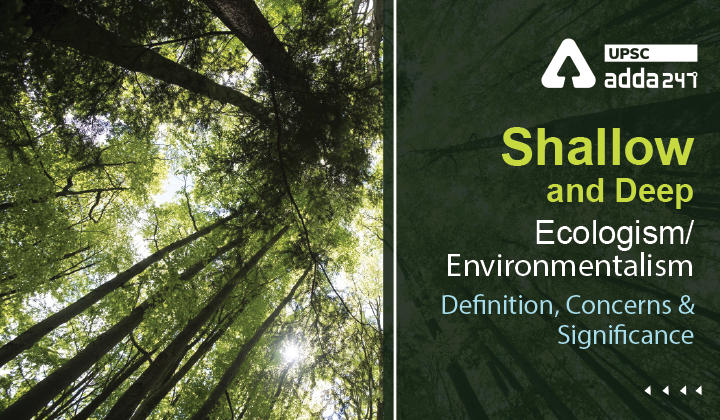Table of Contents
Shallow and Deep Ecologism/Environmentalism- Relevance for UPSC Blog
- GS Paper 3: Environment- Conservation, environmental pollution and degradation.
Shallow and Deep Ecologism/Environmentalism
- All forms of environmentalism will not lead to effective climate change. For example, shallow ecologism which is the fashionable fight against pollution and resource depletion.
Background of Shallow and Deep Ecologism/Environmentalism
- The concepts emerged in the 1970s, when Norwegian philosopher Arne Næss sought to look beyond the popular pollution and conservation movements of his milieu to address environmental degradation.
- He believes that owing to increased anthropocentrism, humans have cut themselves off from nature, viewing nature and themselves as competing entities and establishing a master-slave dynamic.
- By placing humans at the heart of the environmental crisis, Næss outlines the difference between the two styles of ecologism.
- He terms the powerful and fashionable fight against pollution and resource depletion as shallow ecologism or environmentalism.
- On the other hand, deep ecologism believes that humans should radically change their relationship with nature.
Environmental Impact Assessment
Shallow Ecologism/Environmentalism
- About: Shallow Ecologism/Environmentalism is an ecological philosophy that believes in continuing our present lifestyle, but with specific tweaks aimed at minimising the damage to the environment.
- Also referred to as weak ecologism, it may include the use of vehicles that cause less pollution or air conditioners that do not release chlorofluorocarbons (CFCs).
- Concerns with Shallow Ecological Approach: A narrow focus on pollution and conservation movements is counterproductive.
- A holistic perspective to environmental crisis is one which acknowledges regional differences and the disparities between under and over-developed nations.
- This branch of ecologism primarily serves to maintain the lifestyle of those dwelling in developed countries.
- Shallow ecologism prioritises humans above other forms of life, and subsequently preserve the environmentally destructive way of life in modern societies.
- By favouring to sustain present lifestyle, shallow ecologism further widens the inequalities between countries and people.
- For instance, despite constituting only 5% of the world’s population, the U.S. accounts for 17% of the world’s energy consumption and is the second largest consumer of electricity after China.
Analysis of Down to Earth Magazine: Environmental Impact Assessment (EIA)
Deep Ecologism/Environmentalism
- About: Deep ecologism believes that humans should radically change their relationship with nature.
- Opposite to Shallow Ecologism: Deep Ecologism proponents reject shallow ecologism for prioritising humans above other forms of life, and subsequently preserving the environmentally destructive way of life in modern societies.
सीमित एवं गहन पारिस्थितिकीवाद/पर्यावरणवाद- परिभाषा, चिंताएं तथा महत्व
Key objectives of Deep Ecologism/Environmentalism
- Deep ecologism aspires to sustain nature by making large-scale changes to our lifestyle.
- These may include limiting the commercial farming of meat to preserve forest areas and reduce the artificial fattening of animals, or the reshaping of transport systems which involve the use of internal combustion engines.
- Besides advocating these lifestyle changes, deep ecologism shifts the attention from pollution and conservation narratives to robust policy formulation and implementation.
- To recognise the complex richness of different lifeforms, deep ecologism calls for a re-evaluation of the ‘survival of the fittest’ doctrine.
- Survival of the fittest should be understood through the human ability to cooperate and coexist with nature, as opposed to exploiting or dominating it.
- Deep ecologism thus prioritises a ‘live and let live’ attitude over an ‘either you or me’ approach.
Næss recommendations for Deep Ecologism
- Policy-making must be aided by the reorientation of technical skills and inventions in new directions that are ecologically responsible.
- Næss recommends that ecologists reject work that is supervised by authorities with limited ecological perspectives.
- As irreplaceable informants, ecologists should not submit to power which does not recognise critical ecological priorities.
- Næss stresses that the political potential of the movement be realised, and that those in positions of power be held accountable.
- The responsibility of solving the climate crisis falls on policy-makers as much as it does on scientists and ecologists.
Conclusion
- A holistic perspective to the crisis is one which acknowledges regional differences and the disparities between under and over-developed nations.
ESG Funds: Environmental Social and Governance Funds
adda247.com/…/esg-funds-environmental-social-and-governance-funds





 TSPSC Group 1 Question Paper 2024, Downl...
TSPSC Group 1 Question Paper 2024, Downl...
 TSPSC Group 1 Answer key 2024 Out, Downl...
TSPSC Group 1 Answer key 2024 Out, Downl...
 UPSC Prelims 2024 Question Paper, Downlo...
UPSC Prelims 2024 Question Paper, Downlo...




